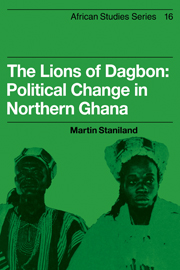Book contents
- Frontmatter
- Contents
- List of maps, figures, and tables
- Preface
- Abbreviations and glossary
- Map 1 Northern Ghana, 1965
- 1 The country and the people
- 2 Dagbon
- 3 Colonial rule, 1899–1930
- 4 Dagomba divided and united, 1899–1930
- 5 The battle of Watherston Road
- 6 Dagomba politics under indirect rule, 1932–1947
- 7 Votibu
- 8 Party politics
- 9 The Yendi tragedy
- 10 Conclusions
- Appendixes
- Notes
- Bibliography
- Index
5 - The battle of Watherston Road
Published online by Cambridge University Press: 04 August 2010
- Frontmatter
- Contents
- List of maps, figures, and tables
- Preface
- Abbreviations and glossary
- Map 1 Northern Ghana, 1965
- 1 The country and the people
- 2 Dagbon
- 3 Colonial rule, 1899–1930
- 4 Dagomba divided and united, 1899–1930
- 5 The battle of Watherston Road
- 6 Dagomba politics under indirect rule, 1932–1947
- 7 Votibu
- 8 Party politics
- 9 The Yendi tragedy
- 10 Conclusions
- Appendixes
- Notes
- Bibliography
- Index
Summary
Every system of Government if it is to be permanent and progressive must have its roots in the framework of indigenous society.
Native Administration will cause a system of graft to be born like unto which Tammany Hall is an infant.
August 1928 saw the beginning of a short and bitter conflict between the ‘die-hards’ of Tamale and the supporters of ‘indirect rule’. The first casualty of the war was the newly arrived acting Chief Commissioner, Major F. W. F. Jackson (deputising for Walker-Leigh, who was absent on leave). Jackson was disturbed by the coolness of his reception in the offices and bungalows strung out along Watherston Road, Tamale, and noted in his diary that he had been made to feel ‘like a Thief in the Night’. Relations between Tamale and Accra had, indeed, reached a critical point, as another ‘southern’ officer observed: ‘there was… in the Northern Territories a definite attitude of hostility to the Coast emanating from the N.T.s headquarters and permeating the whole of its soil. Officers were allowed to speak and write openly of “Accra” (the name by which all authority was known) in a most contemptuous way.’ The war raged around the question of indirect rule -what it meant, whether it was necessary, how it should be applied -until, effectively, December 1929, when Walker-Leigh left, preceded, and followed, by several of his equally die-hard supporters. Thereafter Tamale was firmly in the hands of newly appointed officers, mostly ‘southerners’ and all enthusiastically dedicated to the application of the doctrines of Lugard and Cameron to the unsuspecting Northern Territories.
The dispute was set in train by the removal of Guggisberg from the governorship in April 1927.
- Type
- Chapter
- Information
- The Lions of DagbonPolitical Change in Northern Ghana, pp. 78 - 102Publisher: Cambridge University PressPrint publication year: 1975

